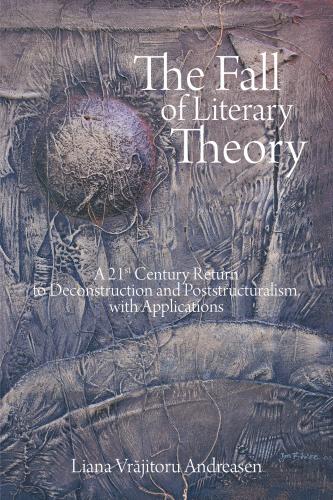The Fall of Literary Theory. Liana Vrajitoru Andreasen
ection>
THE FALL OF LITERARY
THEORY
THE FALL OF LITERARY
THEORY
A 21st Century
Return to Deconstruction and
Poststructuralism, with Applications
Liana Vrăjitoru Andreasen
BrownWalker Press
Irvine • Boca Raton
The Fall of Literary Theory: A 21st Century Return to
Deconstruction and Poststructuralism, with Applications
Copyright © 2017 Liana Vrăjitoru Andreasen
All rights reserved.
No part of this publication may be reproduced, distributed, or transmitted in any form or by any means, including photocopying, recording, or other electronic or mechanical methods, without the prior written permission of the publisher, except in the case of brief quotations embodied in critical reviews and certain other noncommercial uses permitted by copyright law.
BrownWalker Press/Universal Publishers, Inc.
Irvine • Boca Raton
USA • 2017
978-1-62734-689-4 (pbk.)
978-1-62734-690-0 (ebk.)
Cover art: Jon Bibire, bibire.deviantart.com
Typeset by Medlar Publishing Solutions Pvt Ltd, India
Publisher’s Cataloging-in-Publication Data
Names: Andreasen, Liana Vrăjitoru.
Title: The fall of literary theory : a 21st century return to deconstruction and poststructuralism, with applications / Liana Vrăjitoru Andreasen.
Description: Irvine, CA : BrownWalker, 2017. | Includes bibliographical references.
Identifiers: LCCN 2017950750 | ISBN 978-1-62734-689-4 (pbk.)
Subjects: LCSH: Literature--History and criticism--Theory, etc. | Postmodernism (Literature) | Existentialism in literature. | Literature--
Philosophy. | Derrida, Jacques. | Lacan, Jacques, 1901–1981. | BISAC: LITERARY CRITICISM / Semiotics & Theory. | PHILOSOPHY / Movements / Existentialism.
Classification: LCC PS374.P64 A53 2017 (print) | LCC PS374.P64 (ebook) | DDC 813/.5409--dc23.
CONTENTS
2 A Closer Look at the Three Modes of Identity and Fallenness
PART II: APPLICATIONS (FALLENNESS IN AMERICAN LITERATURE)
3 The Fall from Innocence in Billy Budd
4 The Fall from Authenticity in Absalom, Absalom!
5 The Fall from Meaning in The Crying of Lot 49
7 Healing Identity in Tortuga and Beloved
ACKNOWLEDGEMENTS
I want to thank Leslie Heywood and Brett Levinson, my Binghamton University professors who worked with me on my dissertation, which later grew into this book; I thank my husband, Robin Andreasen, who helped edit it in various stages and, more importantly, debated its ideas with me and always encouraged me. I also thank my family, who have been supportive of all of my writing projects, and I thank my old and new friends who never stopped believing in me.
FOREWORD
My love of literature began in a freshman English class in which students read stories and poems and wrote papers on the “meanings” of those works. Each piece I read seemed to be a locked box in which hid a mysterious secret that would be revealed only if I had a special key, one I believed to be in the possession of all my professors. I thought of my literary education as a gnostic initiation in which I had to prove worthy of being awarded a key of my own. I looked forward to a day in which I could unlock all those written treasures.
This was in the late 1970s, and my professors had attended graduate schools where they were steeped in the New Criticism. Follow Brooks and Warren, learn how to apply close readings, and meanings would emerge like flowers in a garden. Poems and stories were organic, self-contained items that should be allowed to speak for themselves, not forced to fit into theoretical templates.
When I studied philosophy in graduate school, that approach to literature aligned well with my interest in phenomenology. Husserl directed us to the things themselves, and Heidegger maintained that his treatment of Dasein was nothing more than a description unfolding from a rigorous introspection. After all, Heidegger taught us that truth is aletheia or unconcealedness, not some property of propositions as the analytic philosophers claimed. Similar approaches came from hermeneutic thinkers such as Gadamer and Ricoeur. All of this deepened my understanding of literature by setting horizons on my readings of fiction and poetry just as these thinkers had done with other art forms.
By the time that I finished grad school and had substantial training in phenomenology and its precursors Kierkegaard and Nietzsche, I found that many other thinkers—all of whom had taken their cue from the phenomenologists—were the rage in literary criticism. They were called “poststructuralists” or “postmodernists,” terms with which I was barely acquainted. How had I missed the excitement? Was their work the logical outcome of the earlier philosophers I adored? I needed to catch up with theory.
Books by Derrida, Lacan, Lyotard, Cixous, Baudrillard, and others cluttered my desk. The array of approaches was vast. Some incorporated forms of Marxism, psychoanalysis, and other ideologies for new ways of understanding, not just literature, but politics, architecture, classical history, and nearly every field of academic study. Theory was exciting for me, although also bewildering. I would read a novel and consider it in terms of deconstruction, reader-response, or the failed Enlightenment project. Invariably, I wondered which approach worked best. Could I combine several, even those that appeared at odds with each other? This occurred when I was beginning to write fiction of my own, and I had to wonder if I was, like other authors (as Barthes claimed), dead.
Just as I began to see literature (and the world) through these theoretical lenses, rumors flew that theory was dead. Theory had led to the rejection of truth, of historical progress, of moral conviction,
